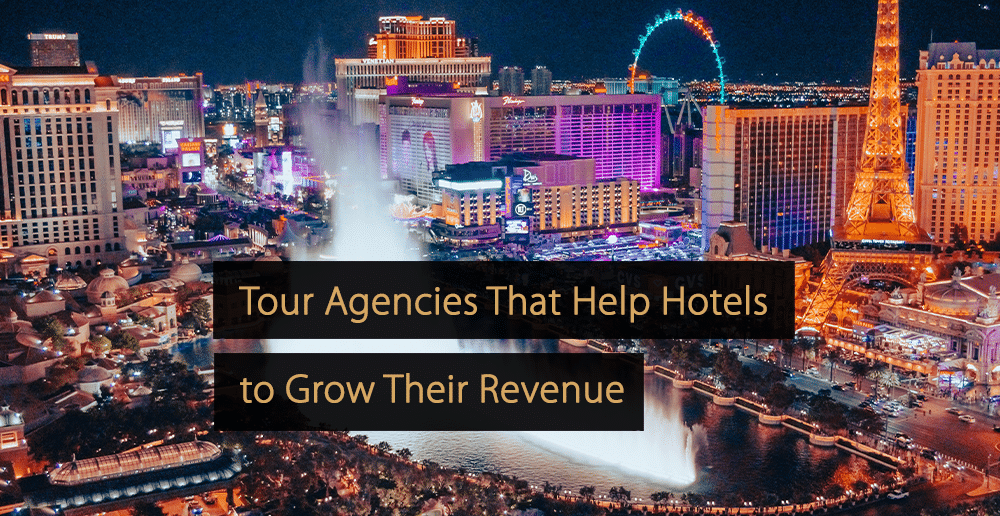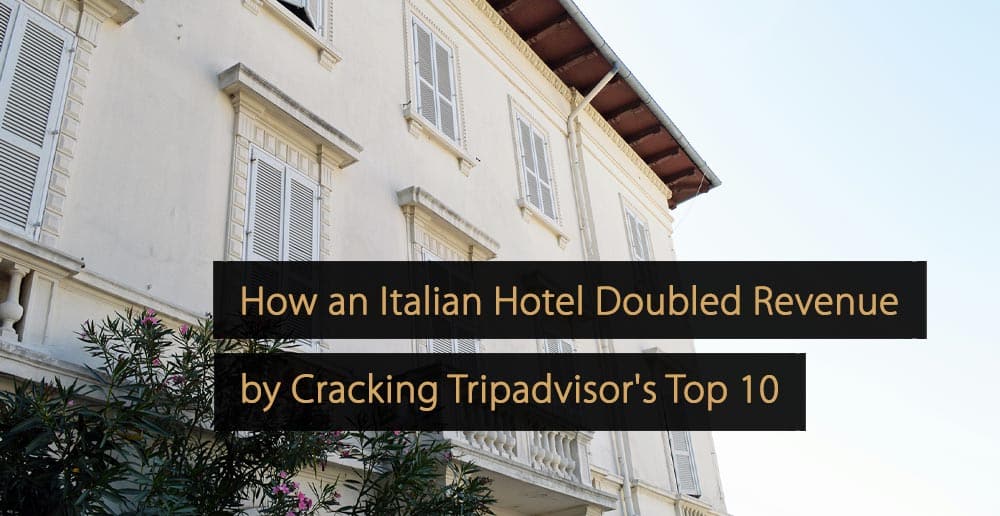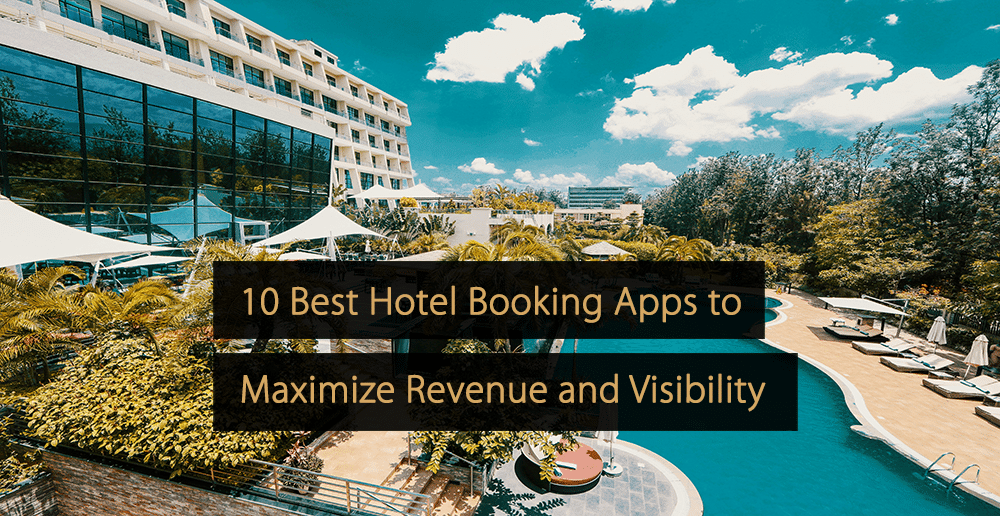Partnering with a tour agency can have significant benefits for a hotel. It’s important to choose a partner that’s right for your hotel. In this article, you’ll discover the pros and cons of partnering with a tour agency and learn about some of the top names in today’s global tour operator landscape.
Table of Contents:
- What Is a Tour Agency?
- The Difference Between Tour Operators and Travel Agents
- How Can a Hotel Cooperate with a Tour Agency?
- Why Should Hotels Partner with a Tour Agency? (Pros and Cons)
- 11 Best International Tour Agencies
- Increase Bookings with Travel Agencies
- The Travel and Tourism Industry
- Tour Operators
What Is a Tour Agency?
Tour agencies are companies that provide package holiday solutions for travelers. Instead of customers having to book accommodation, travel, airport transfers, activities, tours, etc. separately, a tour operator handles the whole trip for them. The tour agency will devise the trip and book everything so that the customer only has to select the package they want. An example of a tour agency’s product would be a package consisting of a charter flight, a transfer from the destination airport to the hotel, and the hotel stay itself. Many packages will also include the services of a tour representative, who can assist with any customer problems, answer questions, and make recommendations. This will be included in a single package for a specific price.
The kind of package described above – flights, hotel accommodation, a hotel transfer, and the support of a representative – is what most people will think of when they hear the term “package holiday“. However, this kind of package is far from the only type of product a tour agency may offer. As more and more people engage in travel and how they travel changes, new and different packages are becoming increasingly popular. Consumers can now choose from products like hiking or cycling packages, tours centered around yoga retreats, winery tours, wellness or detox tour packages, and “bleisure” tours that combine business travel with sightseeing and relaxation. While packages including flights are very common, a tour operator may also sell purely ground-based packages that include only travel by coach, train, or hire car. Some tour operators do business via travel agencies, either traditional store fonts or online, while many others sell their products directly to the public.
The Difference Between Tour Operators and Travel Agents
Because their products may seem superficially similar, there’s often a lot of confusion between a tour operator and a travel agent. A tour agency is responsible for providing holidays, handling all the booking, contracting, and packaging elements that make up a tour package: hotel rooms, entrance to attractions, transport between locations, and so on. On the other hand, a travel agent sells these packages to the customer. They generally don’t handle the bookings and contracts themselves, instead dealing with the tour agency. The travel agent’s job is to match customers with the perfect holiday package for their interests.
A tour agency may offer packages for specific regions and destinations or activities. One might specialize in tours of European wineries, while another might focus on adventure tours in various exciting and exotic regions. A travel agent, by contrast, will sell various packages relating to different destinations. They will work with the customer to find the right package. A travel agent will typically acquire packages from several tour agencies to provide variety for their customers.
A travel agent may also help customers with aspects of their holiday that aren’t included in the tour agency’s package. For example, a land-based tour agency might only include the holiday elements related to the destination, such as accommodation, transfers, and activities. In this instance, the package would not include flights. Those would be left up to the consumer to arrange. If that’s the case, the travel agent might help the customer to find and book flights to and from the destination, while the tour agency would handle everything else.
Video: The Types Of Travel Agents EXPLAINED
How Can a Hotel Cooperate with a Tour Agency?
Partnering with a tour agency can provide several benefits for hotels: additional bookings, extra marketing, increased revenue, fresh opportunities for upselling, more reliable occupancy rates, and more. Here are some tips for working with a tour agency.
Questions You Should Ask Tour Agencies Before Partnering
Negotiations with a tour agency can quickly become complex if you’re not prepared. You must protect your interests while offering your tour agency partner an attractive deal. Remembering some key questions when preparing to enter negotiations with a tour agency for the upcoming contract period is useful.
- How many rooms or beds will be required?
- What will the terms of the allotment contract be?
- What price will be agreed upon? This should reflect a reasonable trade increase, changes in the cost of living, etc.
- How much will be paid in advance?
- What will the contract percentage be?
- When will payments be made?
You should also be ready to produce and discuss historical data regarding the area where your hotel is located.
Which Information Do Hotels Have to Provide to Tour Agencies?
When discussing and negotiating a contract with a tour agency, you must be clear on the main elements relating to hotel operations and how they fit into their collaborations with similar agencies.
These include policies on cancellation, additional services for guests, access to certain hotel facilities, etc. This will help your prospective partner to understand what is being offered and use this information when considering their position.
Some important points to clarify might include:
- Your hotel’s cancellation policies
- The duration of the release period
- The percentage that the tour agency will be required to pay in the event of cancellations
- Your hotel’s official rates
Your tour agency partner will typically invest in promoting your hotel as part of their packages. You might want to consider offering to cover some of these costs.
You need to keep your tour agency partner updated on the hotel’s check-in and check-out policies and any additional perks you offer guests (e.g., rewards for repeat customers).
Why Should Hotels Partner with a Tour Agency? (Pros and Cons)
Before considering a partnership with a tour agency, it’s important to consider the pros and cons. What are the benefits of such a partnership? What are the disadvantages?
Video: OTA’s (Online Travel Agents) Explained | Immense Hospitality | 2019
Pros
There are many upsides to partnering with a tour agency. These include but aren’t limited to:
- Increased Booking Rates: Your tour agency partner will book rooms at your hotel to sell as part of their tour packages. This can often mean an increase in the overall number of bookings you receive, improving your hotel’s profitability.
- Promotion and Marketing: Tour operators actively promote their packages, which translates into additional marketing and promotion for your hotel. Even consumers who don’t opt to buy a full package from the tour agency may still decide to book rooms with your hotel. A partnership with a tour agency can increase your hotel’s reach, profile, and brand recognition without requiring additional outlay.
- Streamlining the Booking Process: A tour agency handles the process of booking customers themselves. This takes a lot of work off the shoulders of the hotelier and their team, leaving them more time to focus on hotel operations and the guest experience.
Cons
Knowing the potential downsides of partnering with a tour agency is also important.
- It Can Be Time-Consuming: Negotiating individual deals with tour agencies can be complex and may require much time. If negotiations fail, your time and effort will be wasted. An alternative might be a bedbank. These companies serve as a single point of contact, effectively allowing you to negotiate and contract with multiple tour companies simultaneously.
- You Might End Up with Less Control Over Your Rates: Tour agencies determine the price of their packages based on several factors and may be unwilling to raise their prices if you wish to raise room rates. This can remove your ability to implement agile pricing and other revenue management strategies. Discounted rates only offered through specific channels may be revealed to other channels, making it difficult to set the right rates for a particular market.
- You Could End Up Giving Too Much Volume to One Agency: Getting the distribution mix right for your hotel business and its brand is very important.
11 Best International Tour Agencies
Countless tour agencies operate in today’s travel landscape, ranging from small regional businesses to global conglomerates. Here are some of the most important.
Booking.com is among the most significant OTA (online travel agent) players. They offer bookings for various travel-related services, meaning that customers can book accommodation, transport, and more on one platform. They also partner with hotels and other providers to offer package deals.
Click here to add your hotel to Booking.com.
The Expedia Group, Inc. offers a full spectrum of online travel services. Through its numerous brands, which include Orbitz, CarRentals.com, Hotels.com, and Vrbo, Expedia allows consumers and businesses to purchase every kind of travel product. They offer travel products both individually and as part of package deals.
Click here to add your hotel to Expedia.
Sabre Travel Network is a travel industry technology provider. It operates the Sabre Global Distributions System (GDS). This is the world’s largest marketplace for travel services, with over $100 billion in travel services bought and sold annually. Partnering with Sabre can dramatically expand a hotel’s reach into international markets.
Click here to add your hotel to Sabre.
Abercrombie & Kent is focused on the world of luxury travel. They were originally founded as a provider of African travel but have since expanded into exotic destinations worldwide. They even arrange trips to Antarctica. If you provide outstanding luxury accommodation, they might be your partner.
Click here to add your hotel to Abercrombie & Kent.
Adventure travel is one of the biggest trends in the travel industry today, and Intrepid Travel is one of the biggest providers. Their mission statement is to deliver experience-rich travel products emphasizing sustainability. Intrepid Travel is an ideal partner for hotels in regions where adventure travel is popular.
Click here to add your hotel to Intrepid Travel.
Based in Singapore, Agoda is an OTA where hotels and other accommodation providers can list their products. It’s popular with travelers at all levels, from budget travelers to luxury seekers. Adding your hotel to Agoda can dramatically increase your reach, as they’re one of the most widely used travel platforms.
Click here to add your hotel to Agoda.
VRBO is a site for holiday rentals. The site exists to connect travelers seeking a home-like experience while on holiday. Instead of conventional hotel rooms, VRBO specializes in holiday homes, apartments, cabins, chalets, villas, and condos. It is a good partner if your portfolio includes self-contained holiday properties.
Click here to add your hotel to VRBO.
Hotelbeds is a bedbank. This independent B2B (business-to-business) company keeps an inventory of accommodations to supply the travel industry. Hotelbeds connects hoteliers with hard-to-access markets, all via a single contract. It’s faster and more convenient than negotiating separate contracts with multiple tour agencies.
Click here to add your hotel to Hotelbeds.
CWT is a travel management company focused on business and corporate travel. It’s a subsidiary of Carlson Inc. Via its subsidiaries, CWT offers a full range of travel services, from meetings, conferences, and other events to travel risk management solutions. It also provides hotel accommodation and travel packages.
Click here to add your hotel to CWT.
Not to be conflated with American Express Travel, this sister company specializes in providing services to business travelers. American Express Global Business Travel offers accommodation, travel, other services, and information, insights, and connections. Its integrated travel packages are intended to streamline corporate travel for its clients.
Click here to add your hotel to American Express Global Business Travel.
The China Tourism Group Duty-Free Corp, often called the China Tourism Group, handles all kinds of travel and tourism throughout China and other Asian countries. It also provides merchandising services. The China Tourism Group is the ideal partner if you want to connect with markets in China.
Click here to add your hotel to China International Travel Service Corp.
Increase Bookings with Travel Agencies
Travel agencies can help consumers save time and avoid frustration by helping them book the travel services they require, from flights and hotels to full-spectrum holiday packages. Tour agencies and other travel companies are increasingly partnering with travel agencies to increase their bookings, raise their profiles, and reach new markets. In this article, you’ll learn everything you need to know about travel agencies. You’ll also discover some of the most important travel agencies to partner with.
To learn more, read “List of Travel Agencies for Travel Companies to Increase Bookings” right now.
The Travel and Tourism Industry
Travel and tourism have a significant overlap. As a hotel owner, it’s useful to know as much as possible about these two closely related industries, and where your business fits in. The list of activities that fall under travel and tourism is long and might include some activities you hadn’t previously considered.
In “Travel and Tourism Industry; A complete Overview of All Activities” you’ll discover the many elements that make up the travel and tourism industries. You’ll learn about the rise of sustainable tourism, how public health issues have impacted the industry, and more.
Tour Operators
If this article on tour agencies has piqued your interest, you’ll certainly want to dive deeper into the world of tour operators and how they can help you develop your hotel business.
In “Tour Operators Hoteliers Should Partner With“, you’ll discover some of the biggest names in global tourism. You’ll discover what markets they serve, where they operate, and how your hotel can benefit from such a partnership. You’ll learn about their differences and get valuable insight into which companies might be right for your hotel.
Tour Agencies FAQs
There are many tour agencies in the world that you might choose to partner with. It’s important to consider the pros and cons of working with a tour agency and choosing the right companies as your partners.
More Tips to Grow Your Business
Revfine.com is the leading knowledge platform for the hospitality and travel industry. Professionals use our insights, strategies, and actionable tips to get inspired, optimize revenue, innovate processes, and improve customer experience.Explore expert advice on management, marketing, revenue management, operations, software, and technology in our dedicated Hotel, Hospitality, and Travel & Tourism categories.
This article is written by:
Hi, I am Martijn Barten, founder of Revfine.com. With 20 years of experience in the hospitality industry, I specialize in optimizing revenue by combining revenue management with marketing strategies. I have successfully developed, implemented, and managed revenue management and marketing strategies for individual properties and multi-property portfolios.


















Leave A Comment